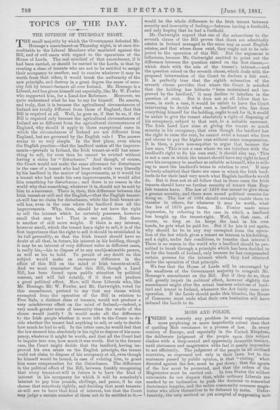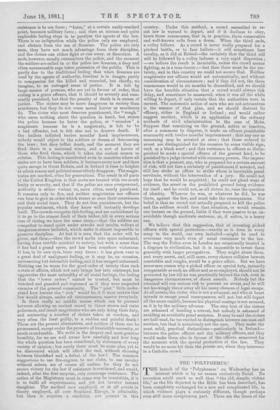MOBS AND POLICE.
THERE is scarcely any problem in social organisation, more perplexing or more imperfectly solved than that of quelling Mob resistance to a process of law. In every country of Europe, and especially in the United Kingdom, the deliberate judgment of the people upon this subject clashes with a deep-seated and apparently incurable instinct,. until statesmen and magistrates alike feel it nearly impossible to act efficiently. The judgment of the people in all civilised countries, as expressed not only in their laws, but in the sentences passed by public opinion, is that "rioting," when directed against the law, must be put down ; that the agents of the law must be protected, and that the orders of the Magistrates must be carried out. In free States the wildest extremists do not dispute that, while ordinary Liberals arc marked by an inclination to push the doctrine to somewhat doctrinaire lengths, and the entire community censures magis- trates who allow themselves to be defeated by mobs. Unfor- tunately, the only method as yet accepted of suppressing mob
resistance is to use force ; "force," at a certain easily-reached point, becomes military force ; and then an intense and quite explicable feeling steps in to paralyse the agents of the law. There is no indignation while the police only are employed, and abstain from the use of firearms. The police are only men, they have not much advantage from their discipline, and the rioters can either fight or run away, at discretion. A mob, however., usually outnumbers the police, and the moment the soldiers are called in or the police use firearms, a deep and often unreasonable rage takes possession of the public. This is partly due to the traditional feeling that when firearms are used by the agents of authority, freedom is in danger, partly to compassion for the killed and wounded, but chiefly, we imagine, to an outraged sense of justice. It is felt by large masses of persons, who are yet in favour of order, that rioting is a grave offence, that it should be severely and sum- marily punished, but that the penalty of death is in excess of justice. The rioters may be more dangerous to society than murderers, but they do not rouse moral horror as murderers do. The rioter who most deserves punishment, the " rough " who cares nothing about the question in hand, but stones the police because he hates the police, or " smashes" a magistrate because he is a magistrate, is felt to be a bad offender, but is felt also not to deserve death. If the bullets inflicted twelve months' hard imprisonment, nobody would object to the soldiers or dream of denouncing the laws ; but they inflict death, and the moment they are fired there is a universal wince, and a sort of horror of those who fired them, which it takes the coolest reason to subdue. This feeling is manifested even in countries where all males are or have been soldiers, it becomes every now and then quite savage in Great Btitain, and in Ireland it rises to heights ' at which reason and political sense utterly disappear. The magis- trates are marked, often for generations. The result in all parts of the United Kingdom is that mobs are treated with too much lenity or severity, and that if the police are once overpowered, authority is either violent or, more often, nearly paralysed. It remains only to fire, and neither magistrates nor officers can bear to give an order which rouses at Once their consciences and their social fears. They do not fear punishment, but the popular sentiment, which they know will instantly develope itself. The crowds recognise this feeling, and are emboldened by it to go to the utmost limit of their tether, till in every serious case of rioting we have the same story,—that the soldiers are compelled to stand quiet under attacks and insults, volleys of dangerous stones included, which make it almost impossible to preserve discipline. At last it is seen that the order will be given, and then,—then the crowd melts into space unharmed, having done terrible mischief to society, but with a sense that it has had a grand spree, and has been somehow victorious. It has, in its own eyes, been very brave ; it has given vent to a great deal of malignant feeling, or it may be, on occasion, unreasoning but defensible feeling, and it has escaped unharmed. Nothing can be worse for the good-order of society than such a state of affairs, which not only brings law into contempt, but aggravates the most unhealthy of all social feelings, the feeling that the "lower orders" cannot be trusted, but must be watched and guarded and repressed as if they were suspected enemies of the general community. The " poor " little under- stand how lenient the " rich" would 'be, if it were certain that law would always, under all circumstances, master everybody. Is there really no middle course which can be pursued between allowing an excited crowd to throw stones and resist policemen, and insult magistrates who are only doing their duty, and sentencing a number of rioters taken at random, and very often the least guilty, to a sudden and painful death ? Those are the present alternatives, and neither of them can be pronounced, except under the pressure of irresistible necessity, BO much as endurable. We write in the deepest and most genuine humility, for we are well aware how carefully and how long the whole question has been considered, by statesmen of every variety of opinion ; but surely there must be some plan yet to be discovered which will effect the end, without choosing between bloodshed and a defeat of the law ? The common suggestions to use fire-engines, to use clubs, to use cavalry without sabres, are of course all useless, for they do not secure victory for the law if resistance is continued, and would, indeed, after the first surprise, only encourage resistance. The action of the Magistracy must in some way be irresistible, if it is to fulfil all requirements, and yet not involve instant slaughter. The method now employed, or at all events in theory employed, all over Southern Europe, is admirable, but then it requires a condition not present in this
country. Under this method, a crowd assembled to re- sist law is warned to depart, and if it declines to obey, hears three summonses, that is, in practice, three consecutive and well-known rolls from a drum. When the third ends, a volley follows. As a crowd is never really prepared for a pitched battle, or to face bullets—it will sometimes face cavalry, as it did at Bristol—the certainty that the third roll will be followed by a volley induces a very rapid dispersion ; ---we believe the result is invariable, unless the crowd means fighting, as in a true enteute ;—but then there must be the cer- tainty, and in this country we could not secure that. Neither magistrates nor officers would act automatically, and without consideration of circumstances ; and if they did not, the three summonses would in six months be discredited, and we should have the horrible situation that a crowd would always risk delay, and sometimes be massacred, when it was all the while willing to depart, if only certain that the authorities were in. earnest. The automatic action of men who are not automatons is the essence of that plan, and we should distrust its efficacy, either in England or Ireland ; and would rather suggest another, which is an application of the ordinary methods of civil administration to the case of Mobs. Suppose that remaining on the ground, active or inactive, after a summons to disperse, is made an offence punishable summarily with twelve months' imprisonment ; that any one so remaining may be arrested at once ; that those ordered to arrest are distinguished for the occasion by some visible sign, such as a black scarf ; and that resistance to officers so distin- guished be made a special offence of the gravest kind, to be punished by a judge invested with summary powers. Our impres- sion is that a peasant, say, who is prepared for a certain amount of risk, will not face a certainty of punishment if arrested, and still less strike an officer to strike whom is inevitable penal servitude, without the intervention of a jury. He could not hope that he would be acquitted ; he could not plead want of evidence, the arrest on the prohibited ground being evidence for itself ; and he could not, as all rioters do, raise the question of identity. Whoever he was, or whatever he did, he was there, against the law, and must take the consequences. Our belief is that no crowd not actually prepared to kill the police and the soldiers would face that situation, or would remaini one instant on the ground, liable if they were passive to an un- avoidable though moderate sentence, or, if active, to a heavy One.
We believe that this suggestion, that of investing picked officers with special protection—exactly as is done in every army in the world, our own included—might bo used to overcome very much even of usual resistance to the law. The way the Police even in London are occasionally treated is a disgrace to civilisation, but it is impossible to invest them generally with larger prerogatives. They might abuse them, and every arrest, and, still more, every chance collision beween constables and roughs, would be a grave affair. But we have never seen reason why a picked officer on special duty, instantly. recognisable as such an officer and as so employed, should not be protected by law till he was practically beyond the risk, even in, dangerous circumstances, of direct assault. Nobody but the criminal will run serious risk to prevent an arrest, and he will not knowingly throw away all his many chances of legal escape. At all events, the rioter who is not a criminal, and who at heart intends to escape penal consequences, will not, but will depart all the more readily, because his physical courage is not aroused, as it is by the military advance. The very best of the rioters are ashamed of heading a retreat, but nobody is ashamed of avoiding an avoidable penal sentence. It may be said the rioters are half-mad, far too excited to distinguish between one man and another, but that is notoriously not the case. They make the most solid, practical distinctions—particularly in Ireland— between the police officers and the military officers, and they would make them also in favour of the officers armoured for the moment with the special protection of the law. They would be no more hit than the priests are, when they intervene in a Catholic crowd.

































 Previous page
Previous page